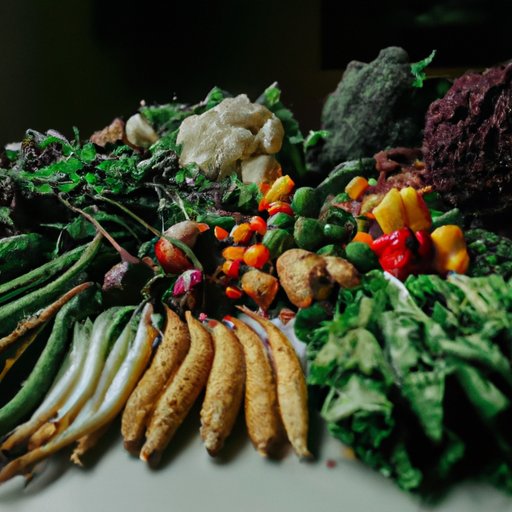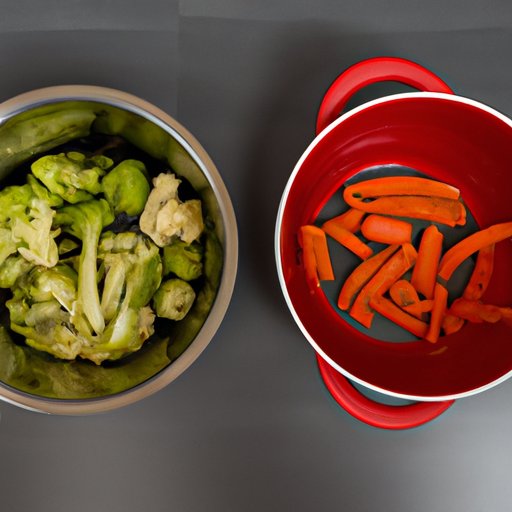Introduction
Eating a nutritious diet filled with fresh fruits and vegetables is essential for optimal health and wellness. Not only do they provide essential vitamins and minerals, but they also contain many other beneficial compounds that can help promote overall health. In this article, we’ll explore the importance of eating vegetables, what types of vegetables are best for you, and how to incorporate more into your diet.
A Profile of the Nutritional Benefits of Eating Different Types of Vegetables
Vegetables are an important part of a healthy diet, providing essential vitamins and minerals such as Vitamin A, Vitamin C, folate, iron, magnesium, and potassium. They are also low in calories and fat, making them a great choice for those looking to lose or maintain weight. In addition, many vegetables are rich in fiber, which helps to promote digestion and gut health. Furthermore, certain vegetables contain antioxidants, which can help protect against oxidative damage and disease.
Different types of vegetables offer different nutritional benefits, so it’s important to include a variety in your diet. Leafy greens like kale, spinach, and Swiss chard are packed with vitamins and minerals, while cruciferous vegetables like broccoli, cauliflower, and Brussels sprouts are high in fiber and antioxidants. Root vegetables like potatoes, carrots, and beets are loaded with vitamins and minerals, while starchy vegetables like sweet potatoes, corn, and squash are high in complex carbohydrates. Finally, legumes like beans, peas, and lentils are a great source of protein, fiber, and other beneficial compounds.

A Guide to Choosing the Healthiest Veggies for Your Diet
When selecting vegetables, it’s important to choose nutrient-rich varieties. Look for fresh, colorful produce that is free from blemishes and bruises. Organic produce is often higher in nutrients and lower in pesticides, so if possible opt for organic varieties. If buying frozen vegetables, look for packages without added sauces or seasonings, as these can add extra calories and sodium.
In addition, consider where your vegetables are sourced. Local farmers markets will usually have a wider selection of in-season produce, while grocery stores may offer a wider selection of year-round produce. Shopping for seasonal vegetables is a great way to ensure you’re getting the freshest, most nutrient-dense produce available.
The Top 10 Superfood Vegetables You Should Be Eating
There are many nutrient-packed vegetables to choose from, but some stand out above the rest as “superfoods”. Here is a list of the top 10 superfoods you should be eating:
- Kale
- Spinach
- Broccoli
- Cauliflower
- Brussels Sprouts
- Sweet Potatoes
- Beets
- Carrots
- Garlic
- Onions
These vegetables are all incredibly nutrient-dense, providing essential vitamins, minerals, fiber, and antioxidants. Kale and spinach are especially high in Vitamin A, Vitamin C, and calcium, while broccoli and cauliflower are excellent sources of fiber and Vitamin C. Sweet potatoes are a great source of beta-carotene, while beets and carrots are loaded with antioxidants. Garlic and onions are both rich in sulfur-containing compounds, which can help reduce inflammation in the body.
What Vegetables Should You Avoid for Optimal Health?
While there are many nutritious vegetables to choose from, there are also some that should be avoided. Common unhealthy vegetables include white potatoes, corn, and peas. These vegetables are typically high in simple carbohydrates and low in fiber, making them less nutrient-dense than other vegetables. Additionally, many canned vegetables are high in sodium and preservatives, so it’s best to avoid these as well.
It’s also important to avoid vegetables that have been treated with pesticides or herbicides. These chemicals can be toxic and can accumulate in the body over time, leading to health problems. To reduce your exposure, opt for organic produce whenever possible.
An Analysis of How Different Vegetables Impact Your Health
Different types of vegetables can have different impacts on your health. For example, leafy green vegetables like kale, spinach, and Swiss chard are high in Vitamin A, Vitamin C, and calcium, which can help support bone health. Cruciferous vegetables like broccoli and cauliflower are high in fiber and antioxidants, which can help reduce inflammation and protect against oxidative damage. Root vegetables like potatoes, carrots, and beets are high in potassium, which can help regulate blood pressure. Finally, legumes like beans, peas, and lentils are a great source of plant-based protein and fiber, which can help support heart health.

How to Incorporate More Vegetables into Your Diet
If you’re looking to add more vegetables to your diet, there are several ways to do so. Start by adding a serving of vegetables to every meal. This could be something as simple as adding a side salad to lunch, or topping your morning oatmeal with sliced tomatoes. You can also try adding vegetables to dishes like soups, casseroles, and pasta sauces to add more flavor and nutrition.
Another great way to add more vegetables to your diet is to make them the star of the show. Try roasting, grilling, or sautéing vegetables to bring out their flavors. You can also experiment with different spices and herbs to add more flavor. Finally, try incorporating more raw vegetables into your diet by snacking on carrot sticks, celery slices, or bell pepper strips throughout the day.

The Pros and Cons of Eating Raw vs. Cooked Vegetables
When it comes to eating vegetables, there is no right or wrong answer. Some people prefer to eat their vegetables raw, while others prefer cooked. Both options have their advantages and disadvantages. Eating raw vegetables can help retain more of their nutrients, as cooking can cause some vitamins and minerals to break down. However, cooking can also make certain vegetables easier to digest and increase the availability of certain nutrients, such as lycopene found in tomatoes.
When deciding between raw and cooked vegetables, it’s important to consider your own health needs and preferences. If you’re looking for more nutrients, raw vegetables may be the better option. If you’re looking for easier digestion, cooked vegetables may be the better choice. Ultimately, the best option is to aim for a balance of both raw and cooked vegetables in your diet.
Conclusion
Eating a variety of vegetables is essential for optimal health and wellness. Not only do they provide essential vitamins and minerals, but they also contain many other beneficial compounds that can help promote overall health. When selecting vegetables, look for fresh, colorful produce that is free from blemishes and bruises, and opt for organic varieties when possible. Additionally, make sure to include a variety of vegetables in your diet, as each type offers its own unique nutritional benefits. Finally, aim to incorporate both raw and cooked vegetables into your diet for maximum nutrition.
By following these guidelines, you can ensure you’re getting all the vitamins, minerals, and other beneficial compounds that vegetables have to offer. So go ahead and start adding more veggies to your diet today!
(Note: Is this article not meeting your expectations? Do you have knowledge or insights to share? Unlock new opportunities and expand your reach by joining our authors team. Click Registration to join us and share your expertise with our readers.)
